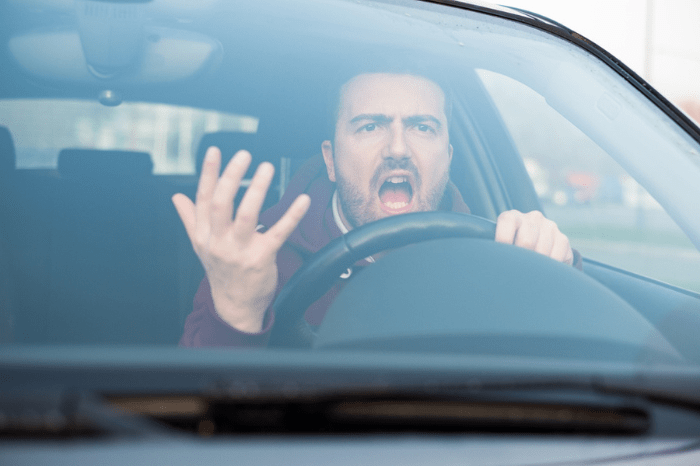Complete the form to schedule a free consultation with a traffic lawyer
Road Rage: How to Understand and Reduce the Risks

The Escalating Issue of Road Rage
Over the past few decades, aggressive driving, commonly referred to as “road rage,” has emerged as a significant concern in traffic safety. A study by the AAA Foundation for Traffic Safety, which analyzed 10,037 police reports and newspaper accounts from 1990 to 1996, found a disturbing trend. It revealed that road rage contributed to 218 deaths and 12,610 injuries. Alarmingly, these incidents showed an annual increase of nearly 7% within that period.
Has that year over year trend continued rising into the modern day? Let’s find out.
Profiling the Aggressive Driver
Who is most prone to road rage? Research points to young males as the most likely perpetrators. Contributing factors include crowded roads, which heighten anger, and psychological elements like stress and displaced anger. Notably, there is a correlation between road rage and substance misuse, including alcohol and drugs.
Psychological Insights into Road Rage
Dr. Jerry Deffenbacher, a counseling psychologist at Colorado State University who has published several research papers on the subject of “road rage”, has identified five distinct traits of high-anger drivers through his research:
- Hostile Thinking Patterns: High-anger drivers often think aggressively, harboring thoughts of revenge and expressing disbelief or insults about others’ driving.
- Riskier Driving Behavior: These drivers are more likely to speed excessively, switch lanes abruptly, tailgate, and run red lights.
- Increased Anger and Aggression: High-anger drivers exhibit more frequent and intense anger, both on and off the road, often resorting to swearing, yelling, or honking in anger.
- Higher Accident Involvement: They are more likely to be involved in car accidents and report near-misses, along with receiving more speeding tickets.
- Elevated Trait Anger, Anxiety, and Impulsiveness: Often already angry due to external stressors, these drivers are prone to outward expression of anger and impulsive actions.
Road Rage: Not an Inevitable Outcome
Despite the grim statistics, road rage is not an unstoppable force. Deffenbacher’s research suggests that under certain conditions, even high-anger drivers can remain calm. Factors such as open roads with less congestion seem to mitigate their anger, underscoring the influence of environmental elements.
Cognitive and relaxation techniques have shown promise in reducing road rage. Deffenbacher’s studies involved therapy sessions focusing on relaxation and cognitive restructuring. These interventions helped drivers manage their anger more effectively by visualizing frustrating driving scenarios and then applying learned techniques in real-life situations.
A technique as simple as a rhythmic breathing exercise can effectively reduce a driver’s anger behind the wheel, although it cannot eliminate it completely. Still, a significant reduction can be the difference between a safe driving experience and conflict, injury, and arrest.
Are Things Getting Worse?
As we continue into 2023, the question arises: are things getting better or worse on the roads? According to a survey conducted by The Zebra, drivers are reporting less road rage incidents in the last five years, although the rate of road rage shootings has increased in that same time period. It’s important to remember that the consequences of lashing out in anger while driving have the potential to be far worse and far more permanent than most people realize. Employ safe driving and de-escalation techniques at all times to make the road a safer place to drive.
If you need to fight a traffic ticket, then click here or call 1-888-296-3059 for a free consultation with a qualified traffic attorney.
